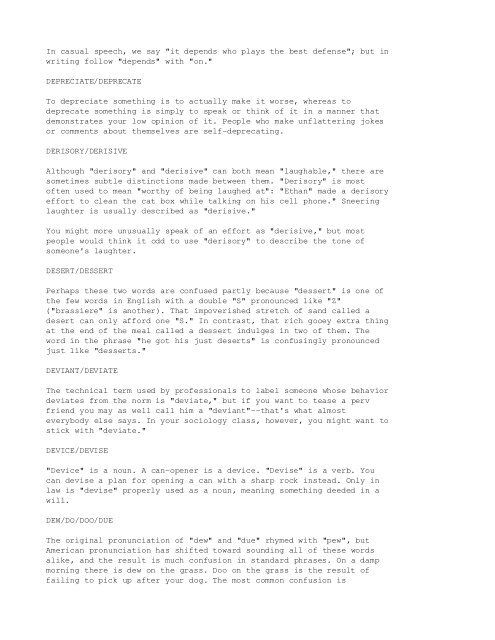Common_Errors_in_English_usage
Common_Errors_in_English_usage
Common_Errors_in_English_usage
You also want an ePaper? Increase the reach of your titles
YUMPU automatically turns print PDFs into web optimized ePapers that Google loves.
In casual speech, we say "it depends who plays the best defense"; but <strong>in</strong><br />
writ<strong>in</strong>g follow "depends" with "on."<br />
DEPRECIATE/DEPRECATE<br />
To depreciate someth<strong>in</strong>g is to actually make it worse, whereas to<br />
deprecate someth<strong>in</strong>g is simply to speak or th<strong>in</strong>k of it <strong>in</strong> a manner that<br />
demonstrates your low op<strong>in</strong>ion of it. People who make unflatter<strong>in</strong>g jokes<br />
or comments about themselves are selfdeprecat<strong>in</strong>g.<br />
DERISORY/DERISIVE<br />
Although "derisory" and "derisive" can both mean "laughable," there are<br />
sometimes subtle dist<strong>in</strong>ctions made between them. "Derisory" is most<br />
often used to mean "worthy of be<strong>in</strong>g laughed at": "Ethan" made a derisory<br />
effort to clean the cat box while talk<strong>in</strong>g on his cell phone." Sneer<strong>in</strong>g<br />
laughter is usually described as "derisive."<br />
You might more unusually speak of an effort as "derisive," but most<br />
people would th<strong>in</strong>k it odd to use "derisory" to describe the tone of<br />
someone's laughter.<br />
DESERT/DESSERT<br />
Perhaps these two words are confused partly because "dessert" is one of<br />
the few words <strong>in</strong> <strong>English</strong> with a double "S" pronounced like "Z"<br />
("brassiere" is another). That impoverished stretch of sand called a<br />
desert can only afford one "S." In contrast, that rich gooey extra th<strong>in</strong>g<br />
at the end of the meal called a dessert <strong>in</strong>dulges <strong>in</strong> two of them. The<br />
word <strong>in</strong> the phrase "he got his just deserts" is confus<strong>in</strong>gly pronounced<br />
just like "desserts."<br />
DEVIANT/DEVIATE<br />
The technical term used by professionals to label someone whose behavior<br />
deviates from the norm is "deviate," but if you want to tease a perv<br />
friend you may as well call him a "deviant"that's what almost<br />
everybody else says. In your sociology class, however, you might want to<br />
stick with "deviate."<br />
DEVICE/DEVISE<br />
"Device" is a noun. A canopener is a device. "Devise" is a verb. You<br />
can devise a plan for open<strong>in</strong>g a can with a sharp rock <strong>in</strong>stead. Only <strong>in</strong><br />
law is "devise" properly used as a noun, mean<strong>in</strong>g someth<strong>in</strong>g deeded <strong>in</strong> a<br />
will.<br />
DEW/DO/DOO/DUE<br />
The orig<strong>in</strong>al pronunciation of "dew" and "due" rhymed with "pew", but<br />
American pronunciation has shifted toward sound<strong>in</strong>g all of these words<br />
alike, and the result is much confusion <strong>in</strong> standard phrases. On a damp<br />
morn<strong>in</strong>g there is dew on the grass. Doo on the grass is the result of<br />
fail<strong>in</strong>g to pick up after your dog. The most common confusion is





